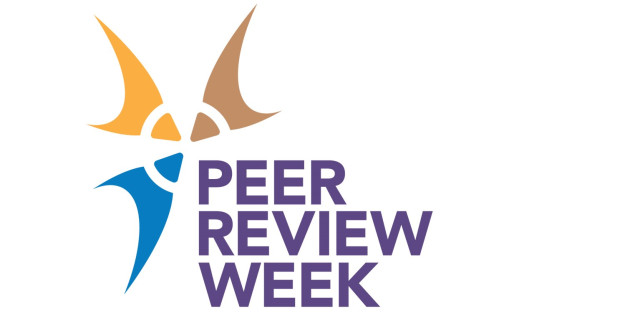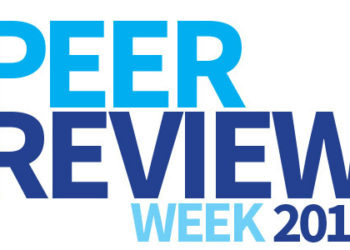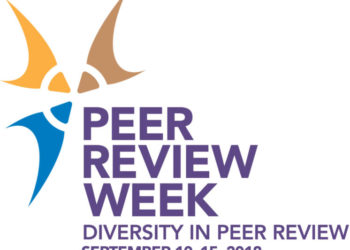It’s hard to believe that this year Peer Review Week (PRW) will celebrate its fifth anniversary. Five years ago, it was literally not even a twinkle in anyone’s eye! So, as we prepare for #PeerRevWk19 (September 16-20), I thought Scholarly Kitchen readers might enjoy a look back at the history of this annual celebration of the essential role that peer review plays in maintaining scientific and scholarly quality.

Year One (September 28 – October 2, 2015)
The first ever Peer Review Week was really a piece of last-minute serendipity. It grew out of a conversation in August, 2015 between ORCID, which I had recently joined as Director of Communications, and AAAS*. At ORCID, we were about to launch the beta version of our peer review functionality, enabling organizations to recognize peer review activities by adding them to ORCID records, while AAAS — an ORCID member — had recently acquired PRE (Peer Review Evaluation). So we were brainstorming ways we could work together, and came up with the idea of a week of posts celebrating peer review on the ORCID blog. But then we thought, why stop there!? So we invited a handful of other organizations that we knew were especially interested in the topic to join the celebrations — ScienceOpen, Sense About Science (whose annual lecture that year inspired the dates for Peer Review Week), and Wiley (my former company). We had all of six weeks or so to organize ourselves, so it was a case of all hands on deck, but amazingly we did (just about!) pull it off (see Welcome to Peer Review Week). Much more importantly, it started a wider conversation about the need to regularly celebrate the importance of peer review to scholarly communications, with numerous other organizations expressing interest in participating.
Year Two (September 19 – 26, 2016)
Thankfully, planning for Peer Review Week 2016 started a lot earlier and involved over 20 organizations, including the original founders. The planning committee decided to choose a theme for each year’s celebrations, starting with “Recognizing Peer Review” for 2016. One of our goals was to recognize peer review in all its many forms, from grant application through promotion and tenure, to conference abstracts, publications, and more. As part of that effort, we started our now annual week of Peer Review Week posts here on the Kitchen, including an interview with Maryanne Martone of Hypothes.is about the importance of annotations as a form of review, and a conversation between Chefs Alison Mudditt and Karin Wulf, as well as Mary Francis of University of Michigan Press, about peer review in the humanities and social sciences. And we created our own video of interviews with people from a range of organizations about how and why their organizations recognize review.
Year Three (September 9 – 15, 2017)
We decided to tie Peer Review Week 2017 in to the Eighth International Congress on Peer Review and Scientific Publication, a quadrennial event that gathers peer review experts from around the world. This time, our theme was “Transparency in Peer Review”, and celebrations included a great discussion session after the Congress closed between four peer review experts — Irene Hames (independent peer review and publication ethics expert), Elizabeth Moylan (then at BioMed Central), Andrew Preston (Publons), and Carly Strasser (then at the Gordon & Betty Moore Foundation) — which was also live streamed around the world. In addition, Karin Wulf joined me in co-editing the Scholarly Kitchen PRW posts — and we have been partners in crime ever since! Continuing our tradition of inviting experts to contribute, this year’s posts included a conversation between Rachel Burley (then at BioMedCentral), Seth Denbo (American Historical Association), and Phil Hurst and Stuart Taylor (The Royal Society) about the evolution of journals peer review.
Year Four (September 10 – 15, 2018)
Peer Review Week 2018’s topic was one that is near and dear to me — “Diversity in Peer Review”. To help try to broaden participation, we formed a new sub-committee for international outreach, charged specifically with increasing awareness and involvement from individuals and organizations outside of publishing in the global north. And we were somewhat successful, though this remains a challenge. Events ranged from Twitter chats on the role of gender in peer review and journal publication, overcoming challenges in peer review with Southern Asia, and the global state of peer review, to conference sessions at Entre Pares (Mexico) and ALPSP (UK), and a webinar for Vietnamese graduate students. We also created more support materials, including a handy Event in a Box resource (currently being updated for 2019). Publons published their Global State of Peer Review Report to coincide with PRW, and our week of Scholarly Kitchen posts included one by their Communications Director, Tom Culley, which highlighted what they discovered about diversity in peer review.
Year Five (September 16 – 20, 2019)
And so to this year’s Peer Review Week. The PRW 2019 committee comprises over 40 individuals from 29 organizations worldwide — still predominantly Western and publishing-focused, something which we will continue to work on addressing. This year’s theme is “Quality in Peer Review” (#QualityInPeerReview) and our two subcommittees, for marketing & communications and events & outreach, are working hard to plan and promote more events, activities, and resources than ever before. We warmly welcome all contributions and suggestions from anyone who wants to help us recognize and celebrate the importance of high-quality peer review to scholarly communications, irrespective of your role, organization type, or the form of peer review that you support. Our newly launched web pages for 2019 will be updated regularly between now and Peer Review Week, and we will be happy to include information about your plans for celebrating — simply email the details (type of activity, description, date, registration details (if applicable), and contact information) to peerreviewweek@outlook.com by September 12, 2019, with the subject line Peer Review Week. And don’t forget to follow us on Twitter (@PeerRevWeek) for regular news and updates, as well as the occasional poll!
So five years later what have we learned, and what’s next for Peer Review Week? Here are five of my own reflections – I’d love to hear yours!
- It takes a village! Peer Review Week really is a community effort — over the years dozens of individuals have generously volunteered their time, with the support of their organizations. Thank you to everyone who has contributed, including this year’s Co-Chairs, Emily Jesper (Sense About Science) and Bahar Mehmani (Elsevier), who are doing a fantastic job of steering us to another successful Peer Review Week.
- Peer review brings people together. Although there are many different — sometimes opposing — views of how peer review “should” be done, what makes Peer Review Week special is that we can leave aside our differences and instead focus on celebrating its value to scholarly communications. Just one of the ways we can be Better Together!
- We need more diversity. Despite our efforts, Peer Review Week is still dominated by scientific journal publishers in the global north. To be truly successful we need to find ways to include a much broader array of scholarly communication voices from everywhere in the world. So if you’re one of the many researchers who are actually participating in the review process or work at one of the many diverse organizations they are reviewing for, please join us so that we can make sure your views are heard and your contributions are celebrated.
- Peer Review Week is maturing. Now we are five, we are an established fixture on the calendar for many individuals and organizations. But what about the future of PRW? The planning committee has started to discuss sustainability, governance, and other issues to help ensure that we can persist into the future, but at the moment there are more questions than answers. Addressing those questions will be critical to the future success of Peer Review Week.
- Peer review is here to stay. Despite all the headlines about peer review being broken, our community remains deeply committed to maintaining it as a central tenet of scholarly communications. We recognize that it’s not perfect, and many of us are involved in discussions about the changes that are needed to improve recognition, transparency, diversity, and quality, which is why Peer Review Week has focused on all these topics in its first five years. I’m confident that together we will find ways to continue making those improvements!
*Although AAAS were involved in the initial discussions, they didn’t join the planning group for the first Peer Review Week but were closely involved the following year
Discussion
5 Thoughts on "Peer Review Week Is Five!"
Lovely post Alice. I am very pleased to be playing a part in PRW this year. The team of people involved is superb, and as you say, like a small village 🙂
I am working on some nice ideas – as we speak! – to illustrate the variety of values and qualities of peer review, and how it affects more than just the paper that gets published. We will be getting in touch with everyone about this bit once we have all details in order.
I think peer review is outdated. It is an expensive and slow process that cannot cope with the revision services that the online e-print archives have developed. I write unorthodox, unconventional and often controversial documents that will certainly not pass biased reviewers. I take great care in preparing my documents and theories, such that they are well-founded, self-consistent and contain all necessary references to openly accessible resources. I only publish on openly accessible archives, such as vixra.org, reseachGate.net, and Academics.edu. I do not use arxiv.org because they require registration, which involves endorsement by a colleague that has published in the same subject field. I am an old retired physicist and I do not have many active colleagues left. Further, I have the opinion that I am responsible for the quality of what I read, but that the reader is responsible for checking the validity of what he reads. Peer review never can guarantee the quality of the document. Reviewers are never omniscient and are always biased. The peer review process cannot keep up with the speed of internet communication that is now offered by scientific discussion sites, such as ReaearchGate,net. ResearchGate.net offers projects that focus on whole projects in which many authors exchange viewpoints. I manage a project that focusses on the Hilbert Book Model. I also published the project on Wikiversity. It is one of the sole places where an isolated researcher can publish his ideas. See: https://en.wikiversity.org/wiki/Hilbert_Book_Model_Project
It’s really hard to tell people whose unconventional and unorthodox views would never pass peer review because they’re legitimately crazy or legitimately brilliant. But if the homeopaths and pro-plaguers/anti-vaxxers can get their papers up, then surely a retired physicist with a few active colleagues left can get things through peer review.
If passing through peer review is easy, then it has hardly any value. Many journals exist that say that they publish your paper and peer review it, only want to cash the money and do not even check the editing of the text. More serious journals do not look at your paper if you do not prepay a significant amount of fee or do not even react when you are an isolated author. Publishing the more than 120 papers that appeared on my free e-print archive would have cost me a fortune. My retirement budget cannot cope with these costs.
Thanks for providing the history on Peer Review Week! I had been wondering how it originated!



